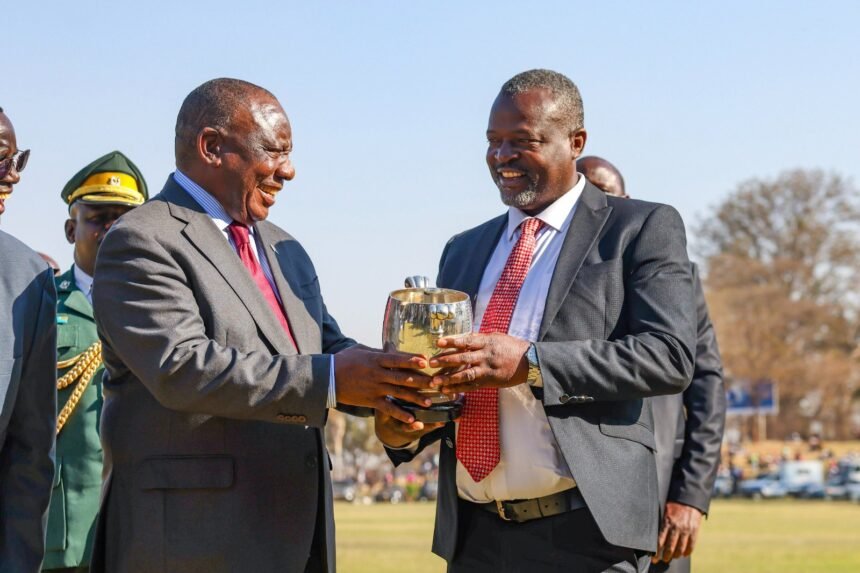South African President Cyril Ramaphosa has hailed Zimbabwe’s efforts to revive its farming sector, describing agriculture as the backbone of economic recovery in the region.
Speaking at the official opening of the Zimbabwe Agricultural Show in Harare on Friday, 29 August, Ramaphosa said the sector held the key to addressing unemployment and poverty across southern Africa. The event, now in its 115th year, is organised by the Zimbabwe Agricultural Society and remains the country’s most prominent platform for promoting innovation and development in farming.
Ramaphosa attended as guest of honour at the invitation of his counterpart, President Emmerson Mnangagwa, during a working visit focused on strengthening bilateral ties. The South African leader arrived earlier in the day to a ceremonial welcome by Mnangagwa and First Lady Auxillia Mnangagwa. The two leaders toured the exhibition stands together, which showcased advances in irrigation, mechanisation and sustainable farming practices, before attending a formal programme at Harare’s Glamis Arena that included a fly-past and guard of honour.
In his keynote address, Ramaphosa commended Zimbabwe’s recent land and agricultural reforms, arguing that they had not only addressed historical injustices but also breathed new life into the sector. “We congratulate the government of Zimbabwe for the measures it is taking to revive the country’s agricultural sector,” he said, adding that agrarian reforms had boosted food security and national development.
The South African President also stressed that climate change posed a mounting challenge, with prolonged droughts and extreme weather reducing yields across the region. He urged governments to invest in research, seed provision, irrigation systems and agro-processing while adopting new technologies to build resilience. Biosecurity, he added, was another pressing concern, with recent outbreaks of foot-and-mouth disease and avian flu underlining the need for regional cooperation.
“Agriculture remains central to both our economies,” Ramaphosa said. “Collaboration among countries is critical if we are to adapt and thrive.” He called on the private sector to seize the opportunities presented by the African Continental Free Trade Area, noting that more than 120 South African companies are already operating in Zimbabwe.
According to the UN’s Food and Agriculture Organisation, agriculture provides employment for between 60 and 80 per cent of people in southern Africa. Ramaphosa argued that creating a more enabling environment for small and medium-scale farmers, particularly women and young people, was essential to unlocking the sector’s full potential.
Beyond the pageantry, the visit reinforced the importance of economic cooperation between South Africa and Zimbabwe. Chairperson of Zimbabwe’s Land Tenure Implementation Technical Committee, Kudakwashe Tagwirei, briefed Ramaphosa on new land tenure arrangements aimed at securing farmers’ rights and improving productivity. The Zimbabwe Agricultural Society also presented Ramaphosa with a token of appreciation to mark his participation in the historic event.
As the show closed, Ramaphosa reflected on the progress he had witnessed, saying Zimbabwe’s agricultural transformation offered valuable lessons for the region. His presence, alongside Mnangagwa, underlined the enduring ties between the two neighbours and their shared belief that agriculture remains the cornerstone of Africa’s economic future.









